History teaches us that Palestine, as with East Timor, will be free, writes Peter Job.

Irish Army Ranger Wing on patrol in East Timor in 2000 as part of the peacekeeping International Force for East Timor led by Australia. (Irish Defence Force official magazine An Cosantóir cover, Wikimedia Commons, CC BY 2.0)
By Peter Job
Declassified Australia
 Given the history of the Israeli invasion of Palestine it is easy to believe that the July 19 ruling by the International Court of Justice, which rules that Israel’s continued presence in the occupied Palestinian territory is unlawful and should end, will be ignored.
Given the history of the Israeli invasion of Palestine it is easy to believe that the July 19 ruling by the International Court of Justice, which rules that Israel’s continued presence in the occupied Palestinian territory is unlawful and should end, will be ignored.
After all, in 1967, U.N. Security Council Resolution 242 called for the withdrawal of Israeli troops from the occupied territories, emphasised the inadmissibility of the acquisition of territory by force, and called for a just and lasting peace.
Back on July 9, 2004, the ICJ found that Israeli settlements in the West Bank and East Jerusalem were in violation of international law. In 2016 Security Council Resolution 2334 condemned settlement, land theft and the displacement of Palestinian civilians, and called on Israel to abide by international law.
These and other resolutions have had little impact on either Israeli behaviour or Western support for Israel. Settlement, displacement, land theft, claimed annexation and repression of the Palestinian people continue apace.
Western nations continue to enable this through diplomatic and economic support, the propagation of false narratives, and the provision of arms.
While it is therefore tempting to conclude that such resolutions and judgements mean little, an examination of a liberation struggle that bears real similarities to that of Palestine, demonstrates that international law is indeed significant in a lengthy and difficult journey to national liberation.
It also has significant implications for the solidarity campaign in Australia and other Western countries if we are to continue to pressure our governments to cease their support for Israel’s illegal actions and support a just outcome for the Palestinian people.
History’s Echoes
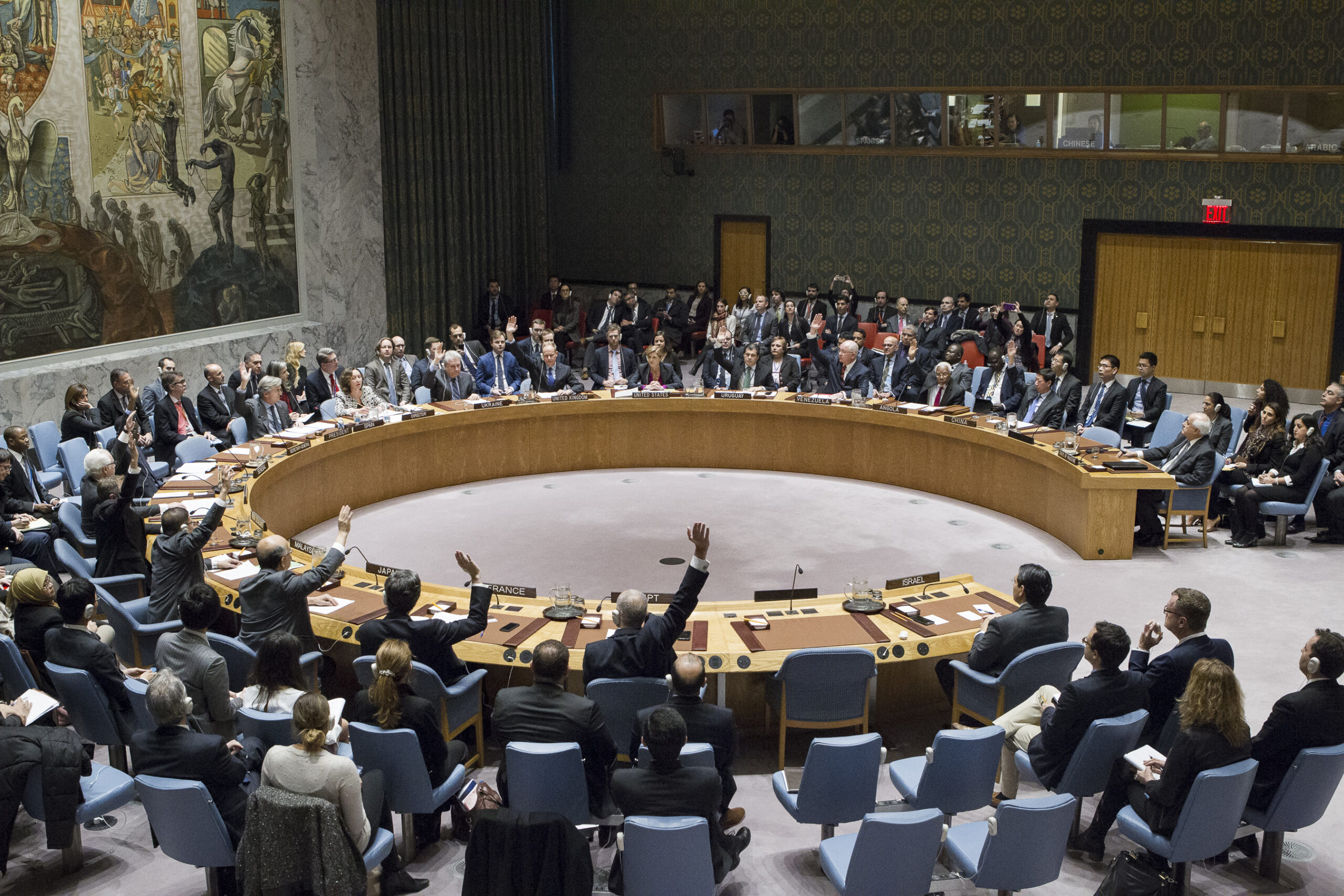
The UN Security Council adopting resolution 2334 in 2016, reiterating its demand that Israel immediately and completely cease all settlement activities in the occupied Palestinian territory, including East Jerusalem. The vote on the resolution was 14 in favor, with one abstention, by the United States. (UN Photo/Manuel Elias)
In 1975 Indonesia invaded the former Portuguese colony of East Timor, with the approval of, and armed by, the U.S., Australia and other Western nations. The occupation continued for a further 24 years, marked by an ongoing resistance by the East Timorese people and by large scale human rights abuses by the invaders.
With the media kept at bay, a military campaign was carried out of encirclement and annihilation to destroy the resistance, including an artificially produced famine aimed at forcing the surrender of much of the population to prevent them providing sanctuary to the resistance forces.
As many as 180,000 people died during the first five years of occupation, and the total death toll during the occupation is estimated to have left up to a third of the population dead. A transmigration plan was undertaken by the Indonesian government to bring in thousands of new settlers from the invading country.
The similarities between what was done to East Timor and what is being done to Palestine are haunting.
Timorese resistance to Indonesia’s invasion and occupation consisted of an internal military resistance (legal under international law), a non-violent civil resistance, and an external diplomatic wing that lobbied extensively at the UN and throughout the world.
The diplomacy was supported by an international solidarity movement that pressured western governments to cease their support for the occupation. Activists suffered slander and abuse, accusations of naivety, of irresponsibly undermining the Australia/Indonesia relationship and even of being motivated by anti-Indonesian racism.
International Law & the Struggle
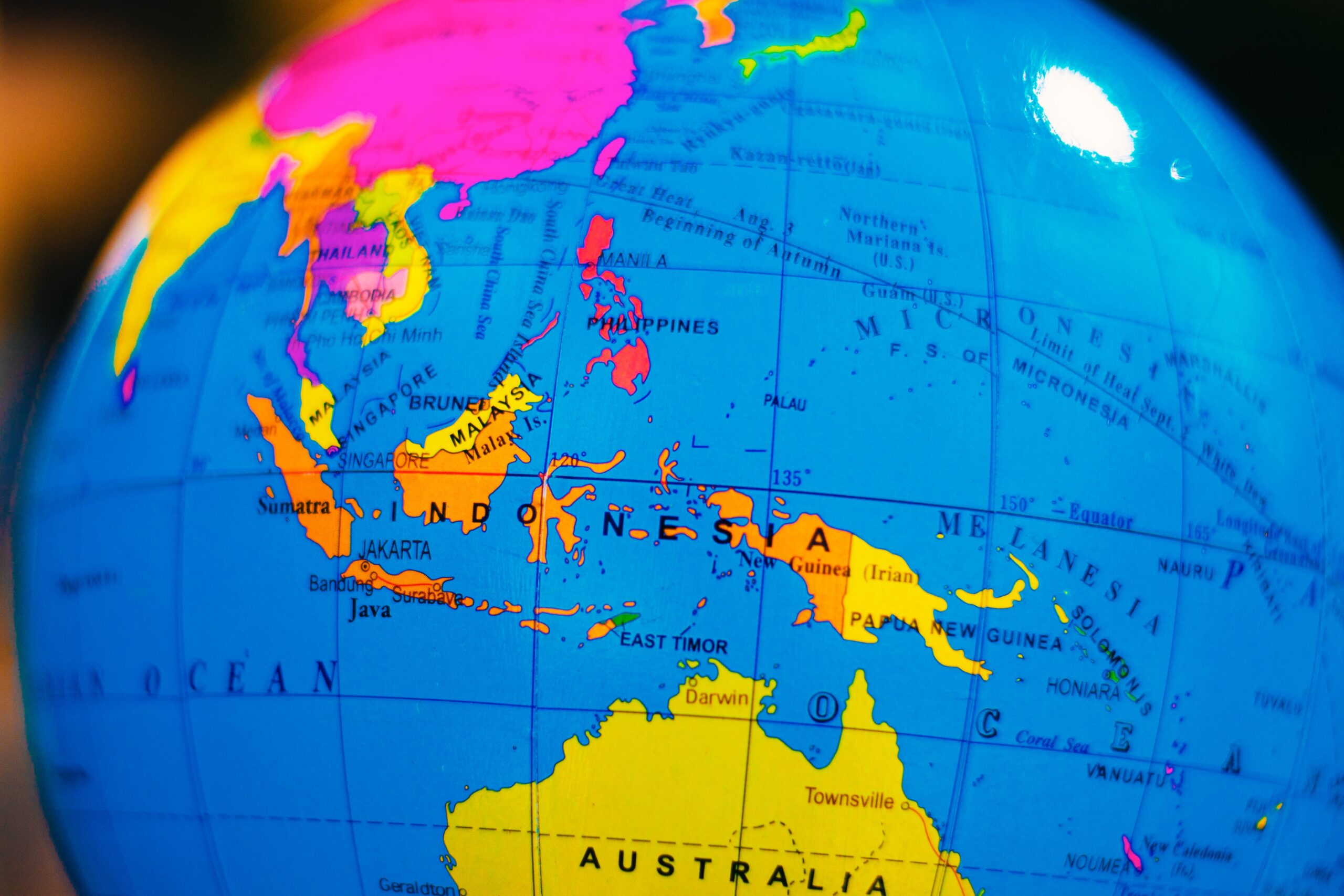
Globe showing Indonesia, East Timor and Australia. (Nothing Ahead, Pexels)
Neither the East Timorese declaration of independence on Dec. 7, 1975, nor the supposed incorporation of East Timor into Indonesia, claimed by Indonesian authorities after a perfunctory “act of integration” in May 1976, was recognised by the United Nations.
Australia was singular in recognising East Timor as part of Indonesia in 1977, but other nations did not follow. Under international law, the territory retained the status of a non-self-governing territory that had not undertaken an act of self-determination, with Portugal still the official administering power.
From 1975 to 1983 there were two U.N. Security Council and eight yearly General Assembly resolutions supportive of East Timorese self-determination and critical of the Indonesian occupation.
These were largely opposed by the Western powers, including Australia, the U.S., Japan and the U.K. Australia in particular lobbied on behalf of the occupying power, denying evidence of abuses, promoting a false narrative about the nature and origins of the conflict and lobbying for the removal of the East Timor issue from the U.N. agenda.
From 1980 Portugal lobbied actively for an act of self-determination. Most European Community countries maintained a reluctant abstention, with West German officials explaining to Australian diplomats that they wanted to oppose such resolutions but were prevented by public opinion and the German Timor solidarity movement.
The U.N. General Assembly resolutions were supported largely by the global south, including many African powers. The Soviet Union voted in support although most of its Eastern Bloc allies moved to abstention from 1979.
The General Assembly resolution of 1983 referred the matter to the good offices of the secretary general, ensuring that it remained officially on the U.N. agenda, despite no longer pursued on a yearly basis.
While Indonesia and its Western supporters worked to position the Indonesian takeover of East Timor as an irreversible fait accompli, the continued legal status of the territory at the U.N. and under international law prevented this.
The parallels with Palestine today are clear. As with East Timor, international law supports the Palestinian position. As with East Timor, Western powers are the obstacle to a just settlement.
The crucial point is public action
The legal status of East Timor was a vital tool for the East Timorese diplomatic struggle, and the solidarity movement that supported it, and international activists were able to use it to pressure their governments to change their position.
On Nov. 12, 1991, hundreds of young Timorese were killed when the Indonesian military fired on a peaceful protest. It proved a turning point as it was filmed by British journalist Max Stahl and broadcast around the world. This became known as the Santa Cruz Massacre.
The public outrage at the massacre saw solidarity groups formed or revived in the U.S., Germany, Australia, Ireland, Portugal, the Philippines and elsewhere. After resistance leader Xanana Gusmão was captured by the Indonesians in 1993 he succeeded in leading the international campaign from his prison cell.

Xanana Gusmão in a safe house in Dili during the occupation in 1991. (Tonyduartefc, Wikimedia Commons, CC BY-SA 4.0)
The resistance’s U.N. representative, José Ramos Horta, continued to lobby at the U.N., enabled by the status of East Timor under international law. The movement received a boost in 1996 when, after years of lobbying, he along with Timorese Bishop Bello, were jointly awarded the Nobel Prize for Peace.
As the 1990s progressed, both the Portuguese government and the Portuguese Parliament lobbied internationally and at the U.N., for an act of self-determination.
This, and the status of East Timor as an “unresolved” matter before the U.N., countered the narrative propagated by Australia, the U.S. and other Western governments that the Timor issue was a matter of the past and the Timorese resistance irresponsible and unrealistic.
The resistance and the solidarity movement were increasingly able to challenge the false Western narratives regarding the nature and origins of the conflict. Western media covered the conflict more, and with greater accuracy. The establishment New York Times even editorialised against Indonesia.
History Turns a Corner
With pressure on Indonesia mounting, Suharto’s successor, B.J. Habibie, viewed the Timor issue as an increasing obstacle to normalising relations with the international community.
In January 1999 he announced a “popular consultation” on the territory’s future. The leadership of the Indonesian military however deeply resented this move to self-determination in a territory where they had been fighting an active resistance. It orchestrated a campaign of violence that both preceded and followed the United Nations-supervised independence vote, taking hundreds more Timorese lives.
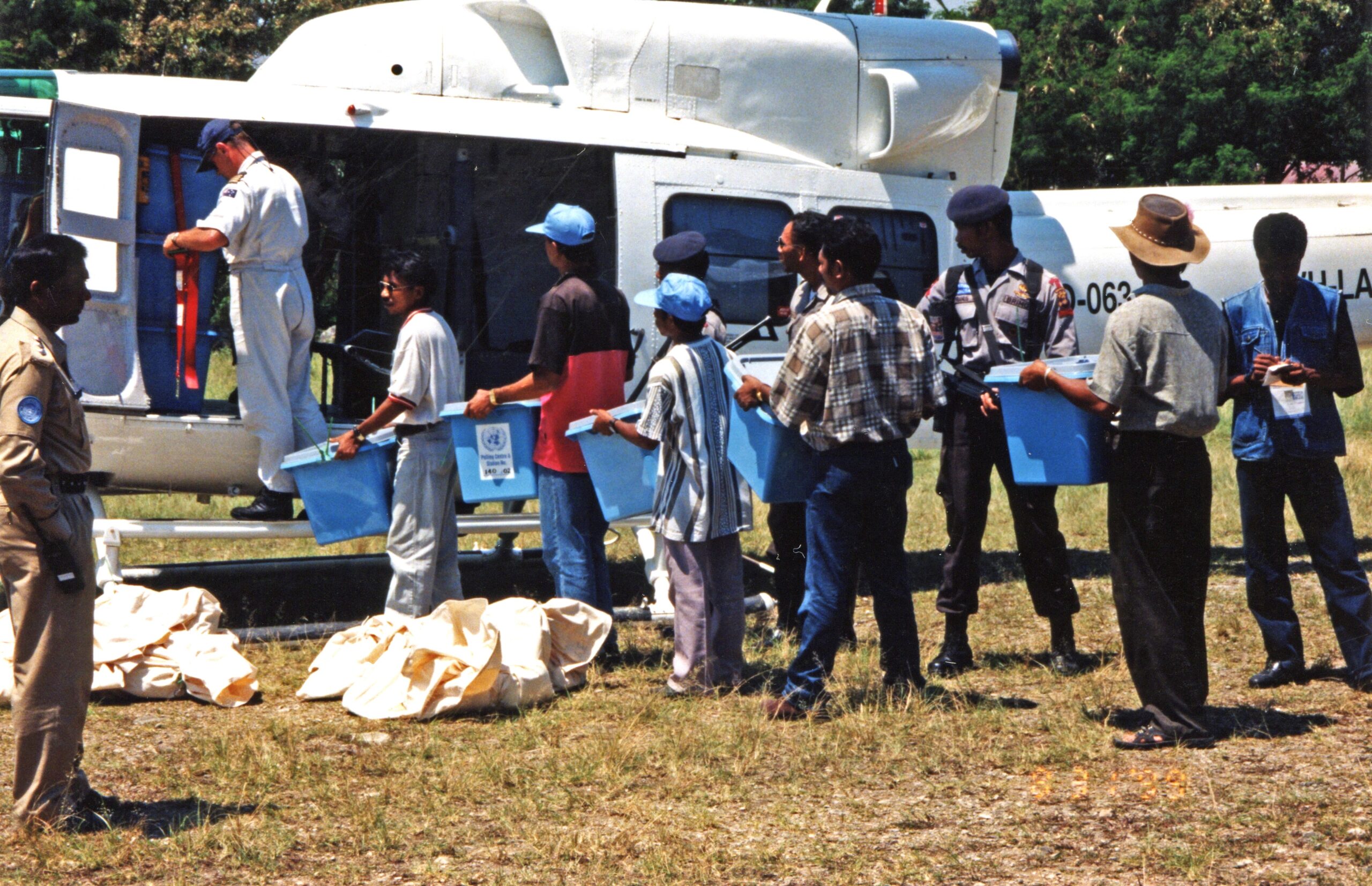
U.N. officials in 1999 transporting the ballots on East Timor independence. (Anna Voss, Watch Indonesia!, Wikimedia Commons, CC BY-SA 3.0)
Nevertheless, some 78.5 percent of Timorese voters chose independence on Aug. 30, 1999. After a further scorched earth campaign drove hundreds of thousands from their homes, a U.N. Security Council mandate authorised an Australian-led international peacekeeping force that arrived in East Timor on Sept. 20 to end Indonesian control.
After a U.N. administration and elections, the Democratic Republic of East Timor emerged as an independent nation on March 20, 2002.
While Australia, the U.S. and Western nations eventually played a part in facilitating the road to Timorese independence, they have never acknowledged the proactive and illegal role they played in supporting the Timorese genocide, and few people in these countries are aware of it. Denial and forgetting continue as a part of our national identities.
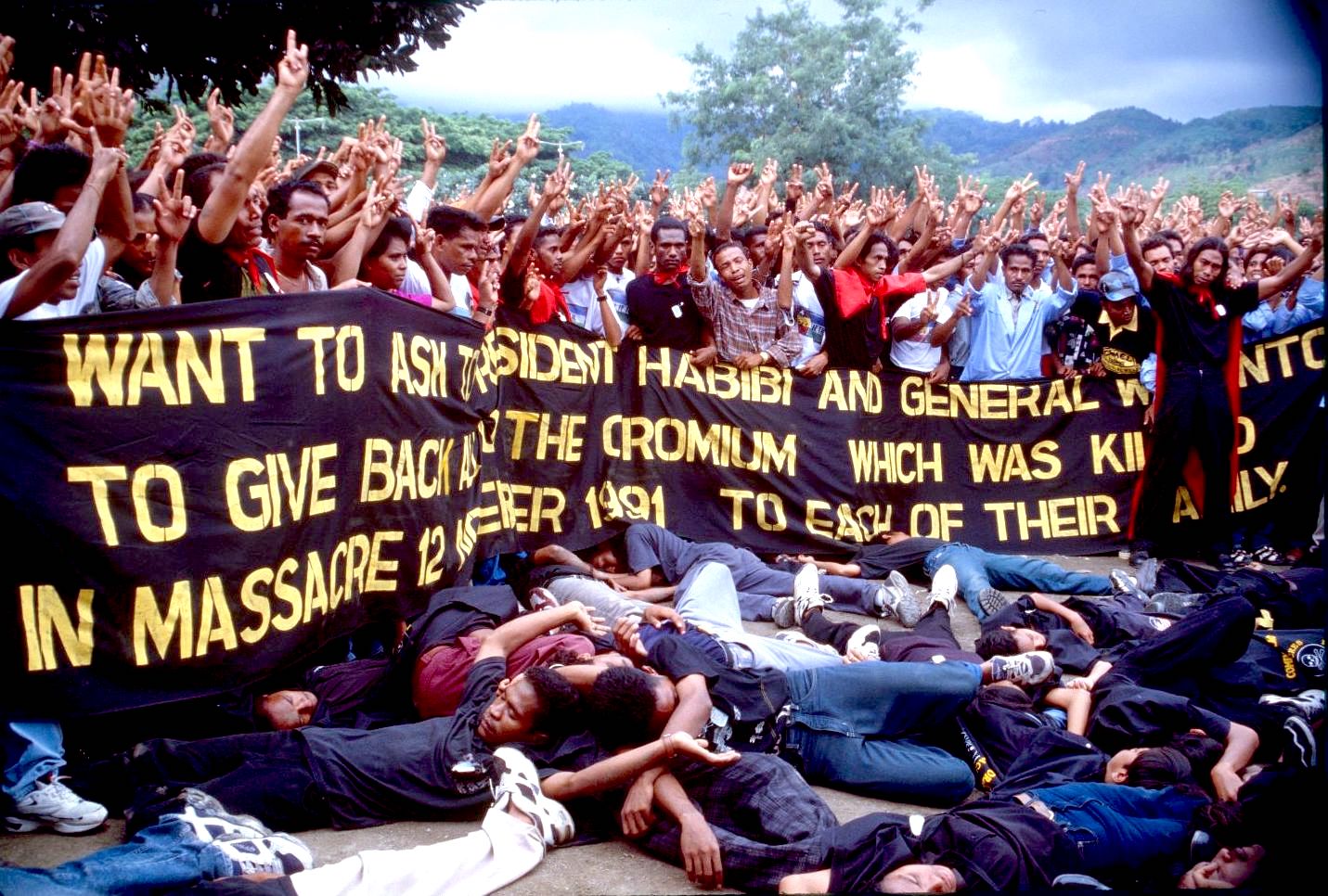
A re-enactment of the Santa Cruz massacre in East Timor, November 1998. (Mark Rhomberg/ETAN, Wikimedia Commons)
The Pathway Ahead
The advisory opinion delivered by the International Court of Justice on July 19 concludes that Israel’s continued occupation of Palestinian territory is indeed unlawful; that the state of Israel is under an obligation to end it; that it must not only immediately cease settlement activities but must evacuate all settlers from occupied Palestinian territories; and that that it must make reparations for damage caused by its occupation.
The court finds that the regime of comprehensive restrictions imposed on Palestinians in the occupied territories is in violation of the International Covenant on Civil and Political Rights (ICCPR) in that it involves systematic discrimination based on race, religion or ethnic origin.
This is an effective endorsement of submissions accusing Israel of engaging in racial segregation and apartheid in the occupied territories. In Paragraph 229, the Covenant finds that the “near separation” between settler and Palestinian communities in East Jerusalem and the West Bank breaches Article 3 of the International Convention on the Elimination of All Forms of Racial Discrimination (CERD); in other words, once again, that apartheid exists.
The opinion also finds that all states are under an obligation not to recognise as legal the presence of Israel in the occupied territories, nor to render aid nor assistance in maintaining the occupation.
That finding is an advisory opinion requested by the U.N. General Assembly on Dec. 22, 2022, before the full-scale Israeli assault on Gaza. As the ICJ’s press release makes clear, however, the finding nevertheless is one that has significant implications for countries such as Australia in its dealings with Israel and the occupation.
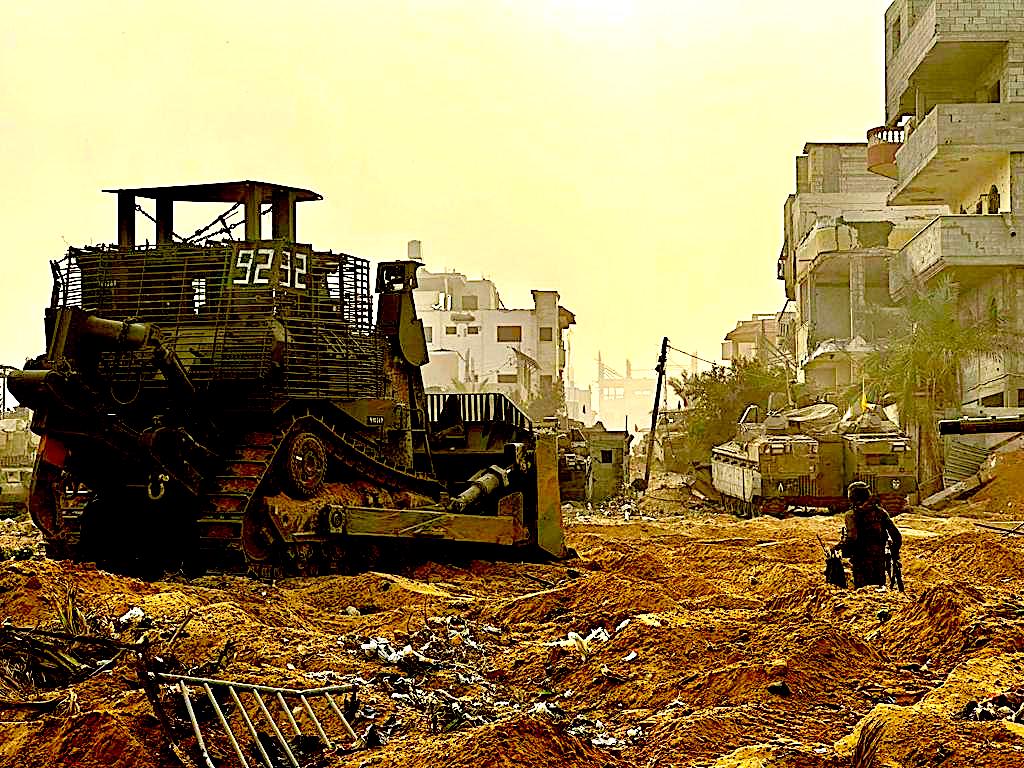
IDF armored bulldozer near Jabalia, Gaza, November 2023. (IDF Spokesperson’s Unit, Wikimedia Commons, CC BY-SA 3.0)
Australia is now under an obligation to cease activities which aid Israel in its continued occupation of the Palestinian territories, including East Jerusalem, the West Bank and Gaza.
The ICJ ruling is realistic in its demand that Israel remove the settlements and has historical precedents.
Before the Algerian War of Independence from colonial occupation by France, for example, pundits across the French political spectrum, including Albert Camus and the French Communist Party claimed that Algerian independence was impossible and the removal of the one million French residents unachievable.
With independence, all but a few returned to France.
With settlers in Palestine only a short distance from Israel and with many holding jobs there, their repatriation is entirely achievable. This is also true for East Jerusalem.
If these things are politically difficult it is because settlement has effectively been endorsed and supported by the Western powers that sponsor Israel’s continued actions and abuses. A changed position by Western countries could produce a very different outcome.
To Uphold the Law
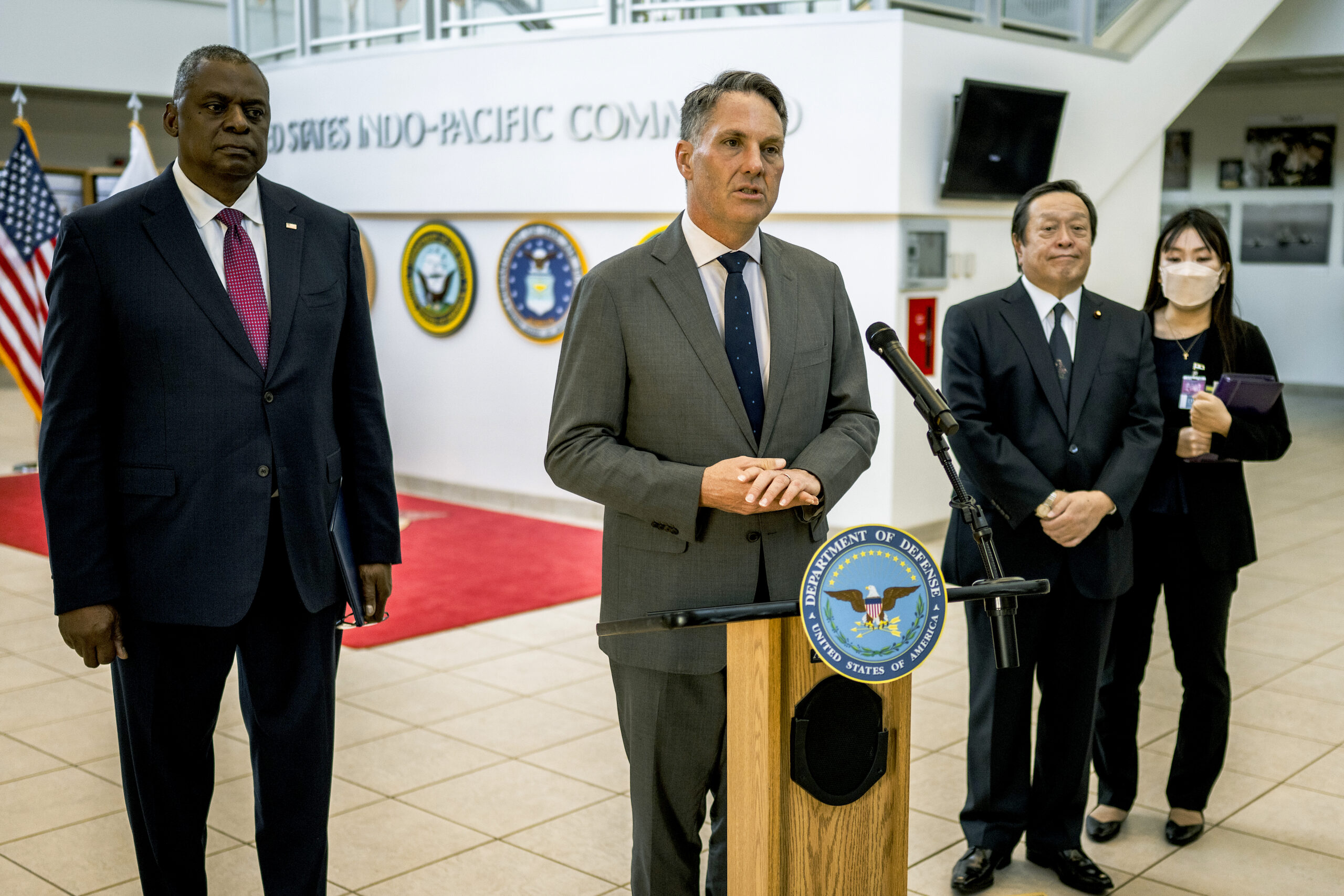
Australian Defence Minister Richard Marles addresses the media at U.S. Indo-Pacific Command, Camp Smith, Hawaii, Oct. 1, 2022. U.S. Secretary of Defense Lloyd Austin, left, and Japanese Defense Minister Yasukaza Hamada, on right. (DoD/ Chad J. McNeeley)
The implications of the ICJ ruling for supporters of Israel, such as Australia, the U.S., the U.K., Germany and others are enormous.
In ruling that such states are under an under obligations not to render assistance to the continued occupation, the ICJ makes the military, economic and diplomatic assistance such states provide to Israel illegal. The removal of this support would drastically impede Israel’s capacity to impose its will in Palestine and make a just settlement far more likely.
While Australia does not occupy the key role of enabler and advocate for the aggressor it played during the occupation of East Timor, its part in supporting the illegal occupation and the ongoing assault on the Palestinian people is nevertheless significant.
This includes its role in the arms supply chain supporting Israel, its production of parts for the F-35 jet fighter, its purchase of Israeli defence materiel, its provision of intelligence through Pine Gap, and its failure to meet its obligations under international law regarding the crime of genocide, war crimes, and other abuses.
Cooperation with the Israeli defence industry extends to the state level, with for example the Victorian government signing an agreement before Oct. 7, 2023, with Israel’s defence ministry to capitalise on “global tensions.”
Australia suspended $6 million in humanitarian support to the U.N.’s relief agency for Palestinians, UNRWA, for almost two months, at a time when Palestinians in Gaza were facing a desperate situation, based on no more than unverified allegations by Israel against a very small number of UNRWA staff.
Australia failed to act on the ICJ’s ruling of Jan. 26 that it is plausible that Israel is violating the Genocide Convention, which places a duty on signatories to take appropriate measures to prevent this.
A communiqué presented to the International Criminal Court (ICC) prosecutor in March by Sydney law firm Birchgrove Legal – since added to evidence used in the ICC’s investigation – also provides a pertinent overview of Australia’s support for the occupation.
This includes public statements made by senior Australia ministers that verge on complicity with the Israeli blockade of Gaza.
Minister of Defence, Deputy Prime Minister Richard Marles, when asked whether Israel had the right to cut off fuel, food and water supplies to Gaza, replied: “Well Israel does have a right to defend itself…”, though adding the caveat, “obviously it needs to do that in a way that acts in accordance with the rules of law.”
“I’m not about to cast a judgment on what they are doing now and that’s the way I would answer that question,” Marles argued. “I’m saying that I think Israel is acting within the rules of law.”
Minister for Foreign Affairs Penny Wong has similarly said:
“Israel’s right to defend itself and secure its borders is legitimate. But like the US President, I would also urge for the observation of international humanitarian law, because whether – civilians on all sides are being harmed, and that is a very distressing situation.”
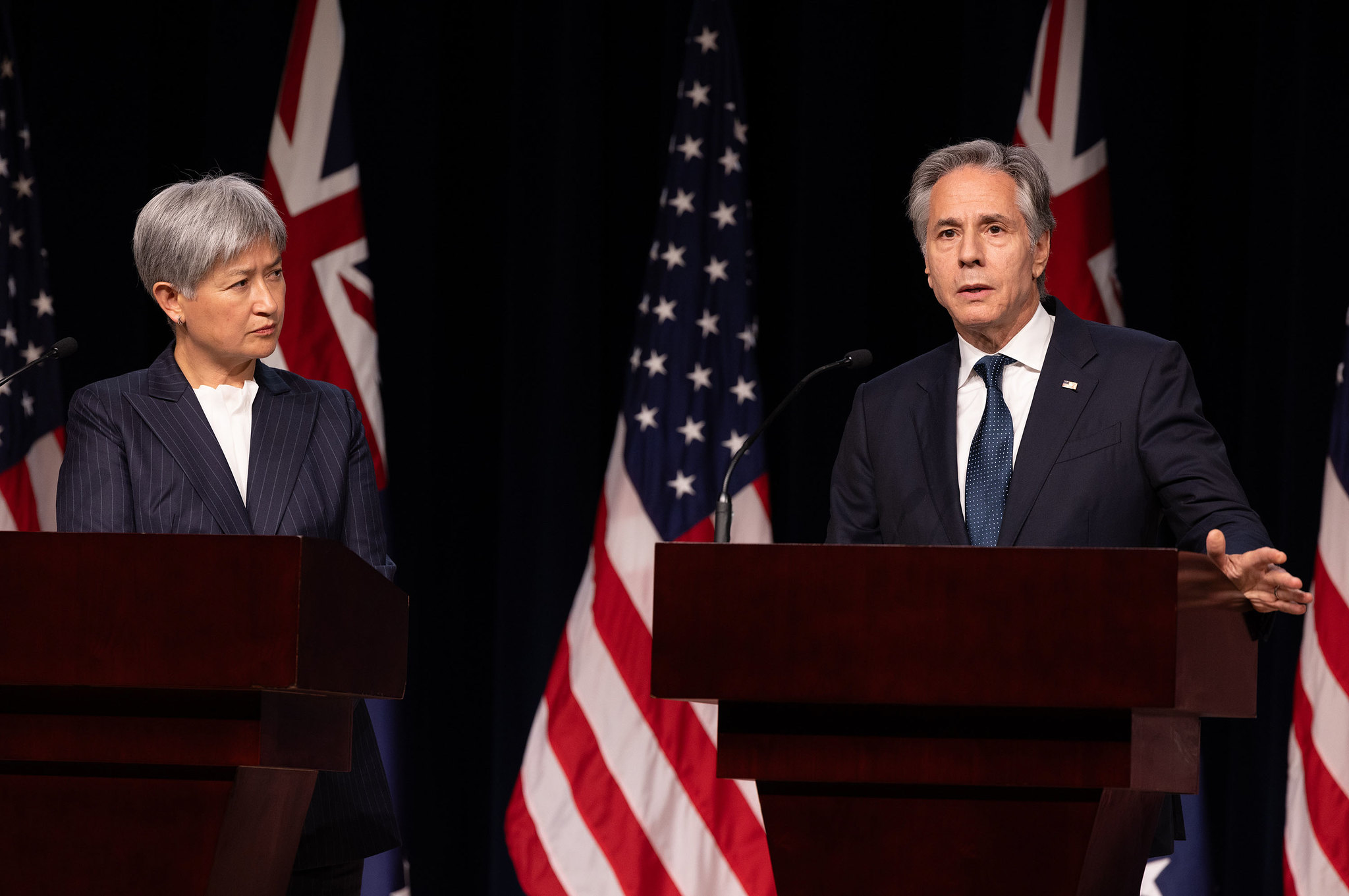
Wong and U.S. Secretary of Antony Blinken at press conference in Annapolis, Maryland, in August. (State Department, Chuck Kennedy)
Australia has significant national security and defence cooperation with Israel, and is failing to take measures available to it to prevent the risk of genocide, such as using those strong “political, military and financial links” to pressure Israel. It also includes Australia’s voting record on Palestine at the U.N.
The application for arrest warrants for senior Israeli and Hamas officials made by the chief prosecutor of the ICC in May, also has significant implications for Australia. As a signatory to the ICC Convention, Australia will have an obligation to act on any warrants that are issued.
Abuse to be Expected
While Timor activists suffered abuse and false accusations of racism, the slander and injury directed against those advocating for a just settlement in Palestine is on a different level.
Journalists have lost their jobs for supporting Palestinians, in the case of one Australian Broadcasting Corporation journalist, for simply reposting material from the highly respected Human Rights Watch.
In February the State Library of Victoria cancelled the contracts of four writers who ran workshops for the library for publicly opposing Israel’s war on Gaza.
After lobbying by pro-Israel groups, an Australian-Palestinian legal and research advisor to the Australian Human Rights Commission was forced to resign in July due to pro-Palestinian posts on social media.
Based on false claims of anti-Semitism, opposition leader Peter Dutton has called for the deportation of pro-Palestinian demonstrators. Across Europe, particularly in Germany, artists making pro-Palestinian statements have been cancelled. In the U.S., students protesting Palestinian rights are silenced and censored.
The political agenda is clear. Nevertheless, in pressuring their own governments, Western supporters of the Palestinian struggle are advocating for a position in accordance with international law, which their own governments are violating. Despite the abuse levelled against them, this greatly strengthens their position.
The Palestinian solidarity movement is vital in the difficult, no doubt lengthy, but nevertheless achievable task of forcing change to our own government’s position on Palestine. The moral case for doing so could not be stronger.
Supporters of Indonesia’s Suharto regime scoffed at accusations of genocide in relation to East Timor, but scholarly research now supports the validity of the term.
Similarly, the South African submission to the International Court of Justice makes a strong case that its use is an accurate description of the situation unfolding in Palestine. A study by the prestigious British medical journal The Lancet has stated that it is “not implausible” that “up to 186,000 or even more deaths,” or 7.9 percent of the total Gazan population, could be attributable to the conflict.
Lessons Learned
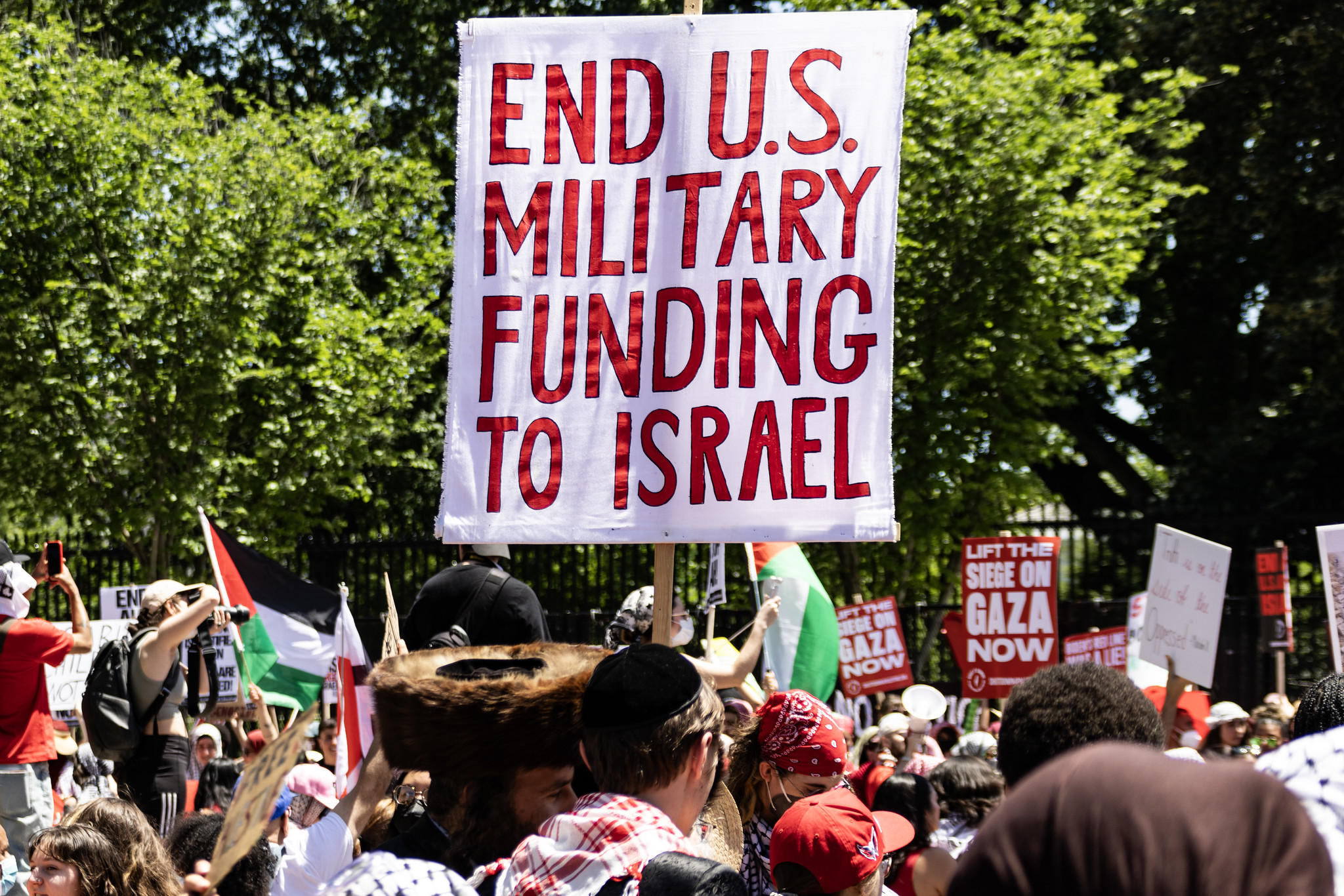
Protesters in Washington, D.C., form “the people’s red line” around the White House to demand end of Gaza genocide on June 12. (Diane Krauthamer, Flickr, CC BY-NC-SA 2.0)
In campaigning for their own governments to support a just settlement for the Palestinian people and oppose their slaughter, activists are not only advocating for the Palestinian cause, but for their own governments to fulfil their obligations under international law.
International law provides the basis for activists to expose the contradictions of Australia’s position on Palestine. These contradictions include the absurdity of Western governments pretending that a process towards a “two-state solution” is underway, when the Israeli government and its parliament, the Knesset, has made it clear it will never of its own volition accept a Palestinian state.
[See: Israeli Lawmakers Vote Against Palestinian Statehood]
They include the Western emphasis on Israel’s supposed right to defend itself, when not only do western governments not view Palestinians as possessing an equivalent right, but the ICJ has made it clear Israel is the primary aggressor, promoting apartheid, racial discrimination and land theft.
The contradictions further include the perennial Western emphasis on the security of Israel when only perfunctory statements of concern are made when Palestinians are killed in their tens of thousands by the state of Israel using western supplied weapons.
Pro-Palestinian activists say little that is not now confirmed by mainstream international legal opinion.
The use of the term “apartheid,” for example, has been condemned by Israel’s supporters as irresponsible and anti-Semitic. Yet now the ICJ has effectively endorsed this claim regarding the situation in the occupied territories.
That does not mean that the accusations of anti-Semitism will stop, nor that such slanders will not continue to be reinforced by our political leaders. It does mean however, that they can increasingly be seen as absurd, and will be likely seen as such, as new generations come of political age.
Forcing Western governments to change their positions on Palestine appears a very formidable task. But history is full of supposedly impossible events.
In June 1994, then Australian Foreign Minister Gareth Evans told The Melbourne Age newspaper that it was impossible for East Timor to regain its independence as the stakes were too high and a “revisiting of sovereignty” was simply not going to happen.
Five years and two months later, after a further tragic and unnecessary cost in East Timorese blood, the Indonesian occupation came to an end.
And so one day the Israeli occupation of Palestine will come to an end.
Learning from the successful East Timorese campaign, the campaign for a just settlement in Palestine is empowered by a number of key truths: that Israel is the primary aggressor and is in violation of international law; that Israel will not of its own accord treat Palestinians as equals or agree to a fair settlement; and that Israel’s repression of the Palestinian people is enabled by the diplomatic, economic and military support it receives from Western nations.
A campaign for a free Palestine will succeed as it works to make our governments frame their policies around these truths, and adopt measures that force Israel to change.
Peter Job helped run a clandestine radio network in northern Australia in 1978 receiving messages from Fretilin inside East Timor, including about the forced famine. Peter has now completed a PhD in international and political studies from the University of New South Wales in Canberra. His new book, A Narrative of Denial: Australia and the Indonesian Violation of East Timor, was published by Melbourne University Publishing in 2021. He is on Twitter @JobPeterjob1.
This article is from Declassified Australia.
Views expressed in this article may or may not reflect those of Consortium News.
Please Donate Today to CN’s Fall Fund Drive



Tibet comes to mind.
Will eventually be free but…how high the human cost???
Thank you Peter!
This is a clear case of double standard which is making the world unsafe every day.
Remember also other places like Kashmir!
Well said. And Wong should know better – no occupation regime has any right to self defense against the people it crushes under occupation.
West Papua will also be free for the same reasons.
“But this was enough for Washington, which was convinced that East Timor could become a ‘Cuba in Asia’-Even though Nixon had already re-established relations with Communist Party in Beijing. He gave Suharto a ‘big wink’ and the Indonesian generals quickly drew up Operasi Seroja – Operation Lotus.”
-Vincent Bevins
The Jakarta Method p.213
“…while both Gerald Ford and Jimmy Carter sat in the White House, Washington’s closest ally in Southeast Asia annihilated up to a third of the population of East Timor, a higher percentage than those that died under Pol Pot in Cambodia.”
-Ibid
And old Biden gives Netanyahu the ‘big wink’ every time he calls for a ceasefire.
And keeps the baby busters comin’
I guess winkin’ at mass murderers is just traditionally presidential.
Thanks Michael,
If you found Bevins’ take on it interesting, you may also find the same about my book on Australian policy to the Timorese genocide.
Well done, Peter Job.
The similarities are so obvious thanks to your writing today. The fact that a Labor government was party to this crime in East Timor and contributed to the crime has parallels to the same climate in Australia today, with a weak group of US sycophants at the helm .
Also in 2024, with the additional penalty of a Zionist albatross around the neck of this now feeble country, which must be reversed for that country to ever be respected again.
A disgraceful period for Australia and the world.
This conclusion certainly bears emphasizing:
“Learning from the successful East Timorese campaign, the campaign for a just settlement in Palestine is empowered by a number of key truths: that Israel is the primary aggressor and is in violation of international law; that Israel will not of its own accord treat Palestinians as equals or agree to a fair settlement; and that Israel’s repression of the Palestinian people is enabled by the diplomatic, economic and military support it receives from Western nations.”